
"Crazy Little Thing Called Love" is a song by the British rock band Queen. Written by Freddie Mercury in 1979, the track is included on their 1980 album The Game, and also appears on the band's compilation album Greatest Hits in 1981. The song peaked at number two in the UK Singles Chart in 1979 and became the group's first number-one single on the Billboard Hot 100 in the US in 1980, remaining there for four consecutive weeks. It topped the Australian ARIA Charts for seven weeks. It was the band's final single release of the 1970s.

Greatest Hits is a compilation album by the British rock band Queen, released worldwide on 26 October 1981. The album consisted of Queen's biggest hits since their first chart appearance in 1974 with "Seven Seas of Rhye", up to their 1980 hit "Flash". There was no universal track listing or cover art for the album, and each territory's tracks were dependent on what singles had been released there and which were successful. In 1992, the US version of the album Classic Queen was released following the band's rekindled popularity in the nation.

Bursting Out is a 1978 live double album by the rock band Jethro Tull. The album was recorded during the band's European Heavy Horses Tour in May/June of that year.
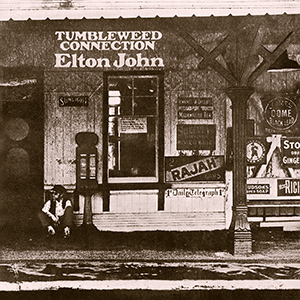
Tumbleweed Connection is the third studio album by English singer-songwriter Elton John. It was recorded at Trident Studios, London, in March 1970, and released in October 1970 in the UK and January 1971 in the US. It is a concept album based on country and western and Americana themes. All songs are written by John and Bernie Taupin, with the exception of "Love Song" by Lesley Duncan.

Honky Château is the fifth studio album by English musician Elton John. It was released on 19 May 1972, and was titled after the 18th century French chateau where it was recorded, Château d'Hérouville. The album reached number one on the US Billboard 200, the first of John's seven consecutive US number one albums.

Caribou is the eighth studio album by English musician Elton John, released on 24 June 1974 by MCA Records in the US and on 28 June by DJM Records in the UK. It was his fourth chart-topping album in the United States and his third in the United Kingdom. The album contains the singles "Don't Let the Sun Go Down on Me", which reached number 16 in the UK Singles Chart and number two in the US, and "The Bitch Is Back", which reached number 15 in the UK and number four in the US. Both singles reached number one in Canada on the RPM 100 national Top Singles Chart, as did the album itself.
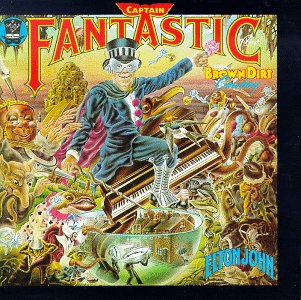
Captain Fantastic and the Brown Dirt Cowboy is the ninth studio album by English musician Elton John, released on 23 May 1975 by DJM Records in the UK and MCA Records in the US. The album is an autobiographical account of the early musical careers of Elton John and his long-term lyricist Bernie Taupin. An instant commercial success, the album was certified gold before its release, and reached No. 1 in its first week of release on the US Billboard 200, the first album to achieve both honours. It sold 1.4 million copies within four days of release, and stayed in the top position in the chart for seven weeks.

Rock of the Westies is the tenth studio album by English musician Elton John, released on 24 October 1975. The title is a pun on the phrase "West of the Rockies", the album having been recorded at Caribou Ranch in the Rocky Mountains of Colorado.

... Nothing Like the Sun is the second solo studio album by English musician Sting. The album was originally released on 16 October 1987 on A&M (worldwide) as a double LP and single CD. The album explores the genres of pop rock, soft rock, jazz, reggae, world, acoustic rock, dance-rock, and funk rock. The songs were recorded in March–August 1987 during sessions that took place at AIR Studios, in Montserrat, assisted by record producers Hugh Padgham, Bryan Loren, and Neil Dorfsman. It features a number of high-profile guest guitarists, including former Police member Andy Summers, Eric Clapton, Mark Knopfler, and Hiram Bullock, and is generally regarded as the culmination of the smoother, more adult-oriented sound of Sting's early work.
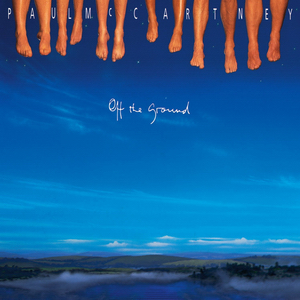
Off the Ground is the ninth solo studio album by Paul McCartney, released on 1 February 1993. As his first studio album of the 1990s, it is also the follow-up to the well received Flowers in the Dirt (1989).

Breaking Hearts is the eighteenth studio album by English musician Elton John, released in 1984. It features the quartet of John, Davey Johnstone, Dee Murray and Nigel Olsson. There were four top-40 singles from the album: "Sad Songs ", "Who Wears These Shoes", "In Neon", and the UK No. 5 hit "Passengers".

"Strange Magic" is a song written by Jeff Lynne and performed by Electric Light Orchestra (ELO). It was originally released on their 1975 Face the Music album.

10cc is the debut album by the British rock band 10cc, first released in 1973. It was recorded at Strawberry Studios in Stockport, which was part-owned by guitarist and engineer Eric Stewart, and released on Jonathan King's UK Records label. The album reached number 36 in the UK Albums Chart.
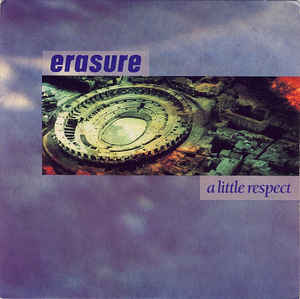
"A Little Respect" is a song written and recorded by British synth-pop duo Erasure, released in September 1988 by Mute. It was written by Vince Clarke and Andy Bell. The lyrics are a plea to a lover to show compassion and respect. The heavily synthesized instrumentation is accentuated by acoustic guitar and Bell's vocal falsetto in the chorus. It was their tenth single and was taken from their third studio album, The Innocents (1988). Known as one of their signature songs, the single reached number four on the UK Singles Chart and was Erasure's second consecutive top-20 hit on the US Billboard Hot 100, where it made number 14, and reached number two on the US Billboard Dance Club Play chart.

Wishbone Four is the fourth studio album by British rock band Wishbone Ash, released in 1973. It was a departure from their previous album, Argus, in that it lacked that recording's overall cohesion and atmosphere and the loose conceptual framework of a stately, pastoral and warring medieval England. Containing only hints of the extended twin-lead guitar harmonies, Wishbone Four's stylistic variety found its footing in acoustic folk elements in half of the eight-song set, two aggressive and melodic starters on each side of the vinyl release, and the band's first use of horns on the semi-autobiographical "rave-up" touring song "No Easy Road".

Sladest is a compilation album by the British rock band Slade. It was released by Polydor on 28 September 1973 and was certified UK Silver by BPI that month. It remained in the charts for 24 weeks. The album was certified UK Gold by BPI in November 1973. In America, Sladest was released by Reprise and featured a significantly different track listing. It reached No. 129 on the Billboard 200.
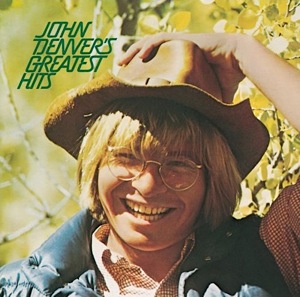
John Denver's Greatest Hits is the first greatest hits album by American singer-songwriter John Denver, released in November 1973 by RCA Records. A version known as The Best of John Denver with the same track listing was released in some countries.

G.I. Blues is the third soundtrack album and seventh (overall) album by American singer and musician Elvis Presley, released by RCA Victor in mono and stereo, LPM/LSP 2256, in October 1960. It is the soundtrack to the 1960 film of the same name in which he starred. Recording sessions took place on April 27 and 28, and May 6, 1960, at RCA Victor Studio C and Radio Recorders in Hollywood, California. The album topped the Billboard Top Pop Album chart. It was certified gold on March 13, 1963 and platinum on March 27, 1992 by the Recording Industry Association of America. The album remained at the #1 spot for ten weeks.
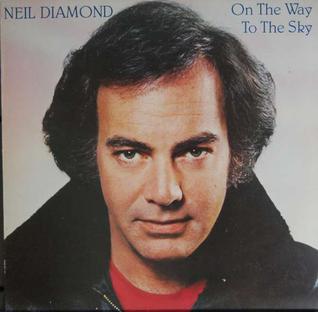
On the Way to the Sky is the fourteenth studio album by Neil Diamond, released in 1981. It contains the hit "Yesterday's Songs", which reached number eleven on the Billboard Hot 100, title track which peaked at number 27 in the US and a third single, "Be Mine Tonight", which also reached the Top 40, peaking at number 35.
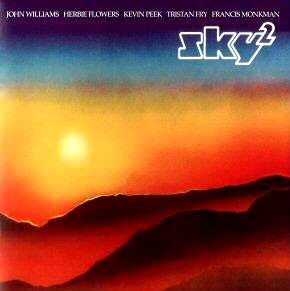
Sky 2 is the second album by English/Australian instrumental progressive rock band Sky, released in 1980. Despite being a double album it reached number one in the British Album charts, and at the time was the fastest double album to receive platinum status in the UK, while the instrumental single "Toccata" peaked at 5 in the British Singles Chart. The album was released in the United States and Canada as Sky, becoming the group's first and highest-charting entry on the Billboard 200.



















